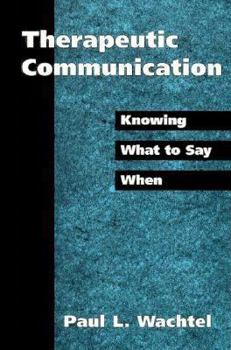Therapeutic Communication: Knowing What to Say When
Select Format
Select Condition 
Book Overview
A uniquely practical guide and widely adopted text, this book shows precisely what therapists can say at key moments to enhance the process of healing and change. Paul Wachtel explains why some... This description may be from another edition of this product.
Format:Paperback
Language:English
ISBN:1572304162
ISBN13:9781572304161
Release Date:January 1993
Publisher:Guilford Publications
Length:308 Pages
Weight:1.09 lbs.
Dimensions:0.9" x 6.0" x 9.0"
Customer Reviews
2 ratings
Exposure and the Art of Interpretation in Therapy
Published by Thriftbooks.com User , 17 years ago
Paul Wachtel is one of the first psychologists to devise an integrative theory of therapy. This book is well written and will be useful to the therapeutic practice of a great many therapists of differing theoretical orientations. In the early chapters he introduces key notions of his approach called "cyclical psychodynamics", which integrates behavioral, cognitive, and systems approaches within a contextually oriented psychodynamic theory and therapy. According to Wachtel anxiety is frequently the result of inner conflicts and experiences that the person has made attempts to avoid and are now surfacing into consciousness, further reinforcing defensive avoidance strategies. He further conceptualizes interpretation in therapy as a means to expose the person to the material of the anxiety as well as the anxiety itself. The bulk of the book explicates the finesse and tact involved in the communicative aspects of such exposure oriented interpretations in therapy, i.e., the art of knowing what to say and when to say it. I look forward to a book by Wachtel that introduces the reader to "all" aspects of his integrative approach.
A rare find-tells therapists *how* to talk to their clients!
Published by Thriftbooks.com User , 27 years ago
Hundreds, maybe thousands, of books review various therapeutic procedures and treatment strategies, encompassing everything from Freudian analysis to primal scream therapy. Dr. Wachtel, however, shuns this traditional theoretical approach. Instead, he focuses on how what therapists actually *say* to their clients affects the therapy process. Dr. Wachtel clearly and succinctly describes the use of subtle word changes in the therapist's comments (both statements and questions) in order to facilitate further exploration and increase the likelihood of positive outcomes. In addition, he provides specific examples and excerpts from actual therapy sessions to highlight the application of his methods. These simple techniques are applicable to various theoretical orientations, therapist educational backgrounds, and client problems. Thus, this book would be useful to any clinician seeking to enrich his or her therapeutic skills, and I highly recommend it for beginning and seasoned practitioners alike






